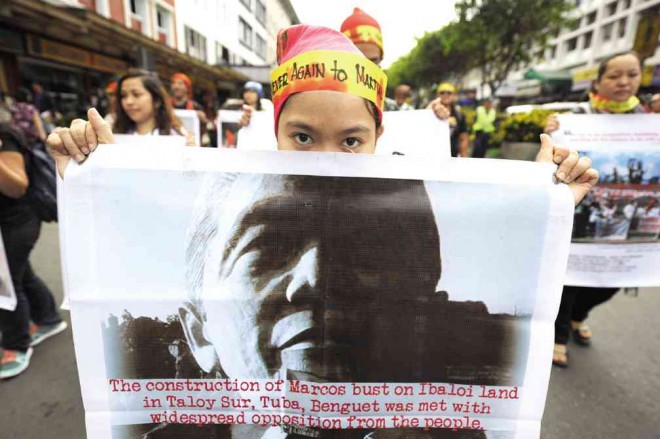
Activists marched in downtown Baguio on Sept. 22, 2015, to revisit the atrocities committed during martial law. Since the ouster of the late strongman Ferdinand Marcos, the monuments to his rule, including a giant bust along Marcos Highway, have been destroyed. EV ESPIRITU/INQUIRER NORTHERN LUZON
The Philippines is this week celebrating 30 years of democracy, but thousands who suffered through the Marcos dictatorship tremble with anger at slow justice and the stunning political ascent of the late strongman’s heir.
President Benigno Aquino will on Thursday lead the commemoration of the “People Power” uprising that allowed his mother, Corazon, to take over from Ferdinand Marcos after he fled to the United States.
But in another part of the city, those who were tortured and imprisoned under martial law will hold their own rally to mourn a lack of justice.
READ: Marcos victims vow to stop Bongbong bid | Remember: We defeated a dictator 30 years ago
They will also try to raise the alarm over the dictator’s only son and namesake from getting elected vice-president, as he has surged to the top of polls with national elections less than three months away.
“We are angry, disappointed, frustrated at the system because until now there has been no justice,” said Marie Hilao-Enriquez, vice president of Selda, a group of people who were detained by Marcos’s security forces.
“The Marcoses have not returned what they stole and they are rewriting history,” said Enriquez, who was imprisoned for two years and whose activist sister was believed killed by government forces.
Treasure hunt
Philippine parliament passed a law in 2013 to distribute money that was plundered by the Marcos family to human rights victims.
However, out of $10 billion that the government estimates to have been plundered, it covers only $210 million that was discovered in a Swiss bank account.
The government says it has recovered close to $4 billion worth of assets, but cannot distribute the vast bulk of it because of legal challenges by the Marcoses and their cronies.
Meanwhile, an arduous process to verify 75,000 claims will not be finished until 2018, and only then can the victims finally get much-delayed compensation.
The victims have submitted medical records, prison logs and photos of themselves bruised or behind bars, according to Lina Sarmiento, head of the Human Rights Victims Claims Board tasked to verify the applications.
Although the money may not be a lot when it is finally distributed, she said it would be an important symbol of justice.
“More than the compensation for the victims, this is a recognition from the state, giving them back their dignity because they suffered for democracy,” Sarmiento told AFP.
“This is long overdue.”
The need to finally recognize and compensate human rights victims is not lost on the government claims board.
A timer that counts down to the number of days until the board’s 2018 deadline to pay all approved claims is installed on every computer screen in their spartan office.
Marcos resurgence
Meanwhile, Ferdinand Marcos Jr. is on the verge of cementing a remarkable comeback for the family.
The dictator died in US exile in 1989, but wife Imelda was allowed to return a few years after with her son and two daughters, and they began rebuilding a political power base.
If Marcos Jr, 58, wins the vice presidency, he would be well positioned for a tilt at the nation’s top post at the next elections in 2022.
In the Philippines, the two positions are elected separately.
His mother and elder sister are also poised for re-election as congresswoman and governor, respectively, of Ilocos Norte, a northern province that has long been the family’s stronghold.
“This is the irony of our time: the activists of the 70s are now ageing and struggling for indemnification and we have not really achieved our objective and here comes another Marcos trying to make a comeback,” Selda president Bonifacio Ilagan, a former student activist who was jailed without trial for two years during the dictatorship, told AFP.
Marcos Jr was not available for comment.
But he has consistently denied any wrongdoing by his family while portraying his father’s 20-year rule as benevolent, with tough measures used only to quash security threats such as communism.
READ: Marcos not apologizing for martial-law abuses means non-acceptance–Robredo
In slick election campaign videos, Marcos Jr proudly declares that “I am not my past” — in a nod to critics of his father — while trumpeting his father’s alleged gains in the economy and peace and order.
Marcos Jr is surging in the polls on the back of the family’s “loyalists” and a generation of voters who were born after the martial law years, political analyst Ramon Casiple told AFP.
One third of the voters in the upcoming election were born after “People Power”, and are susceptible to the Marcos charm offensive as they live in a country still racked by poverty and corruption, according to Casiple.
He said democracy had failed to end these and other long-standing problems, allowing Marcos Jr, known by his nickname of Bongbong, to falsely portray his father’s rule in a golden light.
“Bongbong is portraying the Marcos years as paradise,” Casiple told AFP.